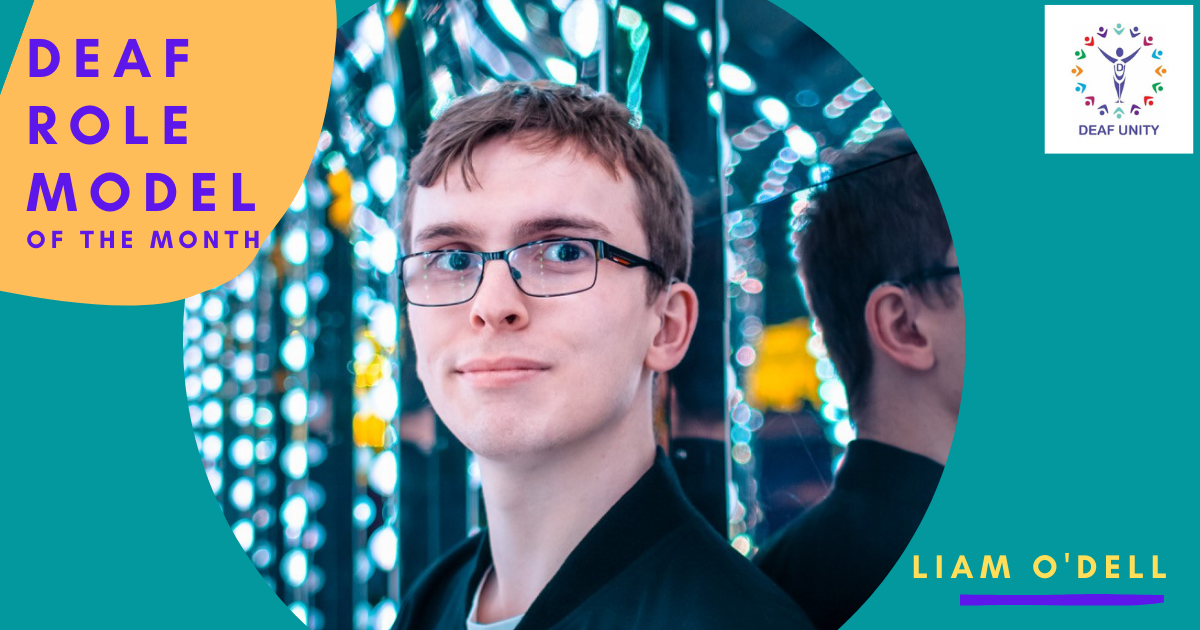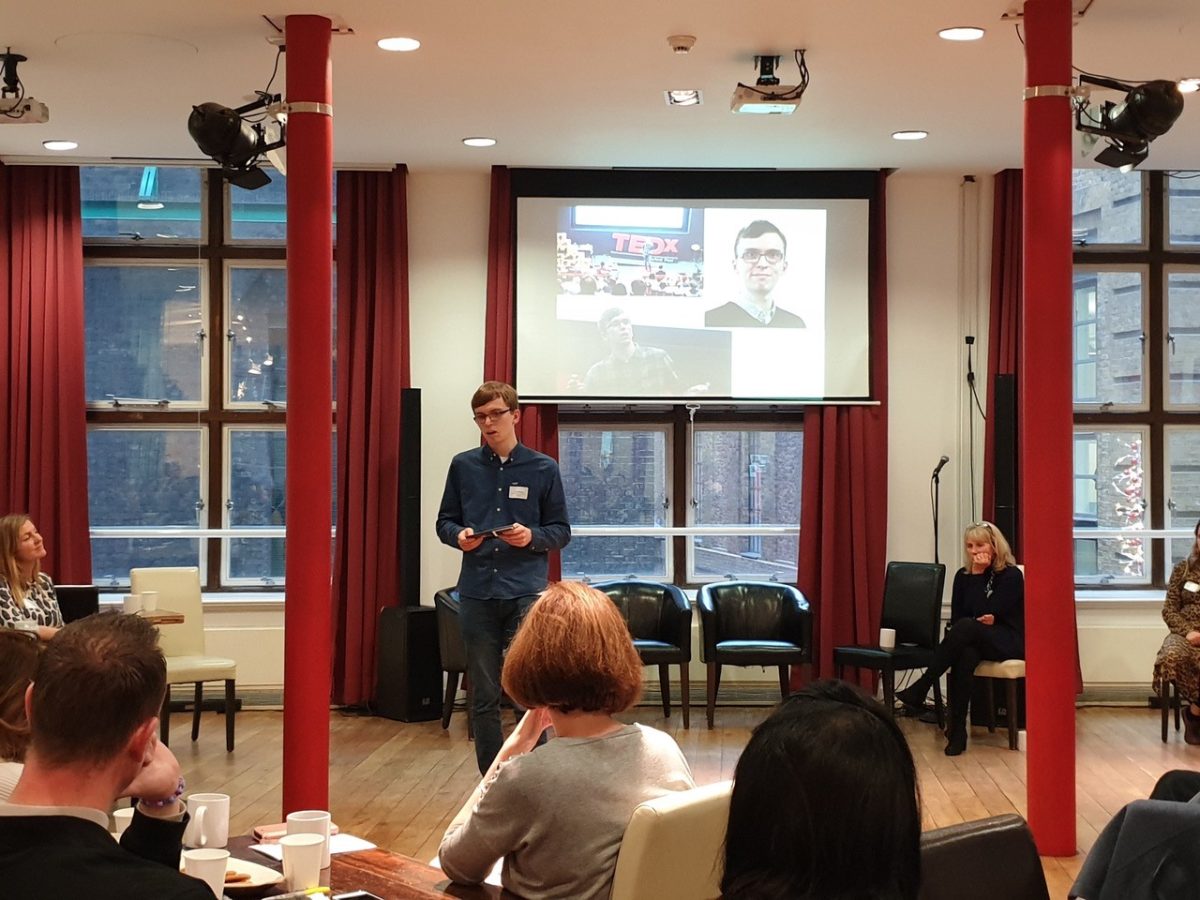
Original Picture:Ant Belle / @anttakesphotos / antbelle.com
Each month we invite an inspirational or outstanding deaf role model to share their story. From what they’ve learnt, to what they wish they’d have known and their best deaf tips.
Our role model this month is a well-known voice on Twitterverse and on hot topics in the deaf and disability sphere: Liam O’Dell.
Liam O’Dell is a freelance journalist and campaigner specialising in deafness, disability and social media. He is a regular contributor to the Deaf news blog The Limping Chicken and his work has also been featured in The Stage, HuffPost, Metro.co.uk, The i and The Independent. He recently won the Young Freelancer Award at the Freelancer Awards for his coverage of the #WhereIsTheInterpreter campaign.
1. Hi Liam! Congratulations on being a Deaf Role Model – tell us about yourself?
I’m Liam O’Dell, I’m 24 and a freelance journalist and campaigner from Bedfordshire. I write regularly for The Limping Chicken, Indy100 and The Independent. I’m the only Deaf person in my immediate family, which is made up of my younger brother and my parents. I’m also a Grade 8 drummer and was mentioned in a court judgment which found the UK Government had breached the Equality Act due to not providing a sign language interpreter for two of its Covid briefings – an issue I’ve reported on extensively since the pandemic started. Other achievements include giving my own TEDx talk in 2017 and being shortlisted in two categories in the 2021 IPSE Freelancer Awards.
2. Can you describe your deafness – how would you describe your ‘Deaf Identity?’
I’m moderately-to-severely Deaf, I wear hearing aids in both ears and communicate orally, though I can hold a conversation in sign language. My Deaf identity and the culture and community associated with that plays a huge part in my life. It is responsible for many of my friends today, my career and opportunities which have sprung up over the years.
3. What was your experience of education and higher education as a deaf person?
It was difficult, though not for the reasons you’d expect. My school was fantastic with supporting me when it came to my deafness, offering up extra time and laptops in exams for to accommodate both my deafness and dyspraxia, a condition affecting dexterity which means I can’t handwrite for very long before my hand starts to ache with really bad pain.
In that respect, and in terms of learning in the classroom, I really enjoyed school, but my dyspraxia and undiagnosed autism – both of which can affect social skills – meant I really struggled with forming friendships. I imagine my deafness and loud school environments didn’t help in some scenarios either.
I had a lot of support at university, too, through my Disabled Students’ Allowance, which allowed me to get a palantypist and transcription support. When I had to do shorthand exams, which involved listening to an audio recording and writing it down, the university were great in positioning me as close to the speakers as possible to offer me a chance to hear what was being said.
4. What challenges have you faced in your professional life and how did you overcome them? Were these compounded by your hearing loss?
I have always found phone calls particularly difficult, for obvious reasons. Fortunately, I can still hear on them and my confidence has increased over time. A lot of my reporting is around online news, or based on interviews which I can easily transcribe, so thankfully, I have some solutions in place for moments where my deafness presents challenges.
5. When did you begin working as a freelance journalist and what motivated you to pursue this career?

The Art of Work
I’ve adored writing from a very young age, always reading books and coming up with story ideas which would run out of steam a few weeks later. Over time this merged with my love of education and learning, and I think journalism was the perfect combination of that. A school careers advisor suggested I set up a blog to build up a portfolio and I did so in 2012. It was the perfect space for me to hone my craft, and not long after being made aware of The Limping Chicken website around 2015, I started writing for them more and more regularly, and have done so ever since.
I started taking it more seriously in 2020, when I left an office job which had a negative impact on my mental health to pursue freelance journalism on a full-time basis. It took a couple of months to get the ball rolling, but just over a year later I’m the busiest I’ve ever been!
6. How did you make the transition from radio to freelance journalism?
I don’t think it was by choice! After doing three years of radio work during my time at university, I no longer had access to a radio studio, so I fell back into doing online journalism instead. That’s not to say that I don’t enjoy or practice radio journalism and do audio work from time to time, though, and I have plans to start up a podcast again soon when I have the time.
7. How do you balance your work as a freelance journalist with campaigning and activism?
I think I’m quite fortunate in that they work well side-by-side. While my freelance journalism often requires me to take a neutral stance on a subject matter, my campaigning work allows me to explore the issue again but from my own personal perspective. There are also articles and ideas I try pitching to outlets, but are unsuccessful, and they often become activism content instead, which is convenient.
8. What does your campaign work focus on and what is your approach?
Over the years it’s kind of developed into focussing specifically on social media and accessibility, which is interesting. That’s enabled me to still talk about deafness, disability and inclusion in an offline society, but also how we break down online barriers too. I think they both complement each other well, and one can teach us a lot about the other.
As for my approach, I like to educate individuals with the understanding that mistakes can be made, and hearing/non-disabled people will always stumble when it comes to accessibility. I strike a stronger tone when it comes to corporations and businesses, however, as their workforce, income and influence are larger and therefore there’s fewer excuses as to why they can’t invest in access.
9. You are very active on platforms like Twitter and recently were verified – how do you feel Twitter has changed the information-sharing / discussion spheres and what value does it have to the deaf and disabled community?
That’s a really interesting question. First and foremost, these platforms allow Deaf and disabled communities to mobilise and share information which, in an offline world, isn’t easily available or accessible to them. This issue also extends to the support available to Deaf and disabled communities too. There are times when online action can lead to offline results (for example, backlash on Twitter against the recent Spectrum 10K study into autistic DNA led to the project being paused by researchers). Especially given the recent situation with lockdown, online platforms have allowed us to keep fighting for disability rights and justice when it wasn’t possible for us to do so in a physical sense.
10. Who inspires you and why? (In the deaf community or otherwise)
Wow, so many people. In the Deaf community, it’s people like Naomi Smart, Lynn Stewart-Taylor, Charlotte Hyde, Charlie Swinbourne, Raymond Antrobus, Sophie Stone, Max Fisher, Jasper Williams, Nadeem Islam, Immy (DeafImmy) and Rikki Poynter.
In the wider disability community, it’s Poppy Field, Dandy (DandyDoodlez), Pippa Stacey, Katie Pennick, Connor Ward, Ellen Jones, and my incredible partner.
11. What ways do you think hearing people can be allies to the deaf community? Any DOs and DON’Ts?
Funnily enough, I wrote about this subject fairly recently, ha! Though in short, we need hearing people to be patient in an otherwise inpatient world, understand every Deaf person has different communication needs, and to realise that anyone can learn sign language, but only a few can teach sign language, meaning you shouldn’t be making sign songs or Deaf awareness content on Instagram or TikTok if you’re unqualified. When inaccessible environments lead to us withdrawing from the situation, hearing people should be looking for opportunities to break down communication barriers, not to create Hearing saviour content in social media. True, meaningful allyship is about uplifting and listening to Deaf people, and not speaking over them.
12. 3 top tips for deaf people?
1 – Find your community: This is perhaps geared more towards those new to the Deaf world, but I knew when I was first diagnosed as Deaf, I needed that community to support me as I found my Deaf identity and understood what it meant to me. I quickly found charities which could support me and give me opportunities, and through that I found my gateway into learning sign language, and I feel that every deaf person should have access to that as soon as possible.
2- There is not one way to be deaf: I’ve certainly been guilty of comparing myself to other deaf activists at times. When I started university, I dismissed the idea of claiming Disabled Students’ Allowance (DSA) because I assumed it was only for those who would need it to pay for British Sign Language interpreters – it wasn’t. Sometimes I’ve questioned my place in the Deaf community because I’m not fluent in sign language. The fact is, as with every community, it’s the diversity and individual experiences within that subculture which makes it so fascinating. Every Deaf person has a story to share and lives life with their own unique Deaf identity. There’s no one way to be Deaf; define it for yourself.
3- More often than not, it’s the hearing world creating barriers for you, not your own deafness: I am one of those people who follows the social model of disability, meaning it’s less about your condition which creates barriers, but society and its attitudes. In the case of deafness, it’s things such as uncaptioned content and loud environments where issues arise. I think the reason why it’s important to recognise this is because it can be easy for us to apologise for when we struggle to hear something, or request that our access needs are met. I know I still say ‘sorry’, and it’s something I’m working on, but we don’t need to! Much like how people argue that a sign language interpreter isn’t there for the Deaf person, it’s there because hearing people can’t sign, it’s not us being difficult when we request access; it’s hearing people failing to accommodate our communication needs.
To read more inspirational role model interviews, take a look here. To read Liam’s work, take a look at his website.
Looking for more support? We’ve made it our mission to improve the lives of deaf people everywhere. Check out Deaf Unity’s projects to find out what we can do for you. If you’d like to get in touch, contact us here.

